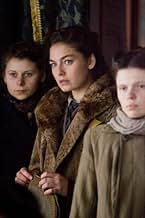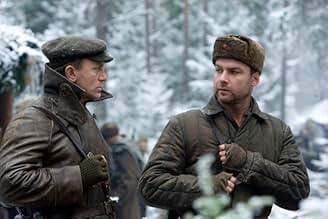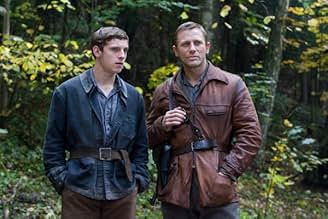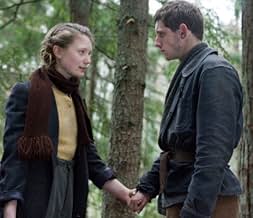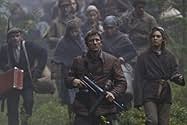Dos hermanos judíos huyen de la Europa oriental ocupada por los Nazis en dirección a los bosques de Bielorrusia para unirse a la resistencia y construir un pueblo que proteja a otros judíos ... Leer todoDos hermanos judíos huyen de la Europa oriental ocupada por los Nazis en dirección a los bosques de Bielorrusia para unirse a la resistencia y construir un pueblo que proteja a otros judíos civiles.Dos hermanos judíos huyen de la Europa oriental ocupada por los Nazis en dirección a los bosques de Bielorrusia para unirse a la resistencia y construir un pueblo que proteja a otros judíos civiles.
- Dirección
- Guionistas
- Elenco
- Nominado a 1 premio Óscar
- 2 premios ganados y 5 nominaciones en total
- Dirección
- Guionistas
- Todo el elenco y el equipo
- Producción, taquilla y más en IMDbPro
Opiniones destacadas
The movie was good. Not Zwick's best effort though and as for the acting it was Liev Schreiber that delivered the most. Every time I see Craig I see James Bond and that other guy, Jamie Bell, was barely even on screen. I'm guessing most of his scenes were cut out of the film to pave the way for more Craig screen time. The action set pieces were mostly impressive but the problem is, its over before you know it. But I can honestly say, it was impressive nonetheless. Its not brainless by any means, the movie has a profound and compelling story. One can only wonder how these filmmakers come up with more WWII movie ideas every year.
From a visual point of view, the movie looks absolutely beautiful. From the authentic weaponry and uniforms to the rich and colorful Lithuanian locations, Defiance may fall flat during some points throughout the film; as with every other black and white war movies that's been released, the Germans are depicted as war machines of death without remorse, if you can overlook these flaws I think it is an enjoyable film and in its entirety, Defiance is an overwhelming movie that doesn't glamorize the war but shows the intense reality behind it all. A must see for all war movie fans out there.
From a visual point of view, the movie looks absolutely beautiful. From the authentic weaponry and uniforms to the rich and colorful Lithuanian locations, Defiance may fall flat during some points throughout the film; as with every other black and white war movies that's been released, the Germans are depicted as war machines of death without remorse, if you can overlook these flaws I think it is an enjoyable film and in its entirety, Defiance is an overwhelming movie that doesn't glamorize the war but shows the intense reality behind it all. A must see for all war movie fans out there.
This is an interesting film about a bunch of Jews commanded by the Bielski brothers taking the Belorussia forests to shelter themselves from Nazi criminals . It is completely set in the woods which it does some claustrophobic . Splendid acting by all-star-cast . Nicely photographed by Eduardo Serra in colorful palette . Emotive and sensitive musical score by the great composer James Newton Howard. This is a true story , worth telling and stunningly directed in old-style by Edward Zwick .
The picture is inspired on real events based on the novel titled ¨Defiance : The Balski partisans¨ , being well adapted by Clayton Frohman and Edward Zwick . The actual events are the followings : The Bielski group's partisan (three brothers finely performed by Daniel Craig , Liev Schriever , Jamie Bell) activities were aimed to hold the Jewish community together and fight against the Nazis and their collaborators, such as Belarusian volunteer policemen or local inhabitants who had betrayed or killed Jews. They also conducted sabotage missions . The Nazi regime offered a reward for assistance in the capture of Tuvia (Daniel Craig) Bielski, and in 1943, led major clearing operations against all partisan groups in the area. Some of these groups suffered major casualties, but the Bielski partisans fled safely to a more remote part of the forest , and continued to offer protection to the noncombatants among their band . The Bielski group would raid nearby villages and forcibly seize food ; on occasion peasants who refused to share their food with the partisans were the subject of violence and even murder. This caused hostility towards the partisans from peasants in the villages, though some would help the Jewish partisans.The Bielski partisans eventually became affiliated with Soviet organisations in the vicinity of the Naliboki Forest under Russian General (in the movie Panchenko is played by Ravil Isyanov). Several attempts by Soviet partisan commanders to absorb Bielski fighters into their units were resisted, such that the Jewish partisan group retained its integrity and remained under Tuvia Bielski's command. This allowed him to continue in his dedication to protect Jewish lives along with engaging in combat activity, but would also prove a problem later on . The Bielski partisan leaders split the group into two units, one named Ordzhonikidze, led by Zus (Liev Schreiber), and the other Kalinin, commanded by Tuvia (Daniel Craig). According to partisan documentation , Bielski fighters from both units killed a total of 381 enemy fighters , sometimes during joint actions with Soviet groups. 50 members of the group were killed. In the summer of 1944, when the Soviet counteroffensive began in Belarus and the area was taken over by the Soviets, the Kalinin unit , numbering 1,230 men, women and children, emerged from the forest and marched into Nowogrodek.Despite their previous collaboration with the Soviets, relations quickly worsened. The NKVD started interrogating the Bielski brothers about the rumours of loot they had reportedly collected during the war, and about their failure to "implement socialist ideals in the camp". Asael Bielski (Jamie Bell) was conscripted into the Soviet Red Army and fell in the Battle of Königsberg in 1945. The remaining brothers escaped Soviet-controlled lands, emigrating West. After the war, Tuvia Bielski returned to Poland, then emigrated to present-day Israel in 1945. Tuvia and Zus eventually settled in the United States. They operated a successful trucking business. When Tuvia died in 1987, he was buried in Long Island, NY, but a year later, at the urging of surviving partisans in Israel, he was exhumed and given a hero's funeral at the hillside graveyard in Jerusalem. His wife, Lilka (Alexa Davalos), was buried beside him in 2001 . None of the Bielskis ever sought any recognition or reward for their actions.
The picture is inspired on real events based on the novel titled ¨Defiance : The Balski partisans¨ , being well adapted by Clayton Frohman and Edward Zwick . The actual events are the followings : The Bielski group's partisan (three brothers finely performed by Daniel Craig , Liev Schriever , Jamie Bell) activities were aimed to hold the Jewish community together and fight against the Nazis and their collaborators, such as Belarusian volunteer policemen or local inhabitants who had betrayed or killed Jews. They also conducted sabotage missions . The Nazi regime offered a reward for assistance in the capture of Tuvia (Daniel Craig) Bielski, and in 1943, led major clearing operations against all partisan groups in the area. Some of these groups suffered major casualties, but the Bielski partisans fled safely to a more remote part of the forest , and continued to offer protection to the noncombatants among their band . The Bielski group would raid nearby villages and forcibly seize food ; on occasion peasants who refused to share their food with the partisans were the subject of violence and even murder. This caused hostility towards the partisans from peasants in the villages, though some would help the Jewish partisans.The Bielski partisans eventually became affiliated with Soviet organisations in the vicinity of the Naliboki Forest under Russian General (in the movie Panchenko is played by Ravil Isyanov). Several attempts by Soviet partisan commanders to absorb Bielski fighters into their units were resisted, such that the Jewish partisan group retained its integrity and remained under Tuvia Bielski's command. This allowed him to continue in his dedication to protect Jewish lives along with engaging in combat activity, but would also prove a problem later on . The Bielski partisan leaders split the group into two units, one named Ordzhonikidze, led by Zus (Liev Schreiber), and the other Kalinin, commanded by Tuvia (Daniel Craig). According to partisan documentation , Bielski fighters from both units killed a total of 381 enemy fighters , sometimes during joint actions with Soviet groups. 50 members of the group were killed. In the summer of 1944, when the Soviet counteroffensive began in Belarus and the area was taken over by the Soviets, the Kalinin unit , numbering 1,230 men, women and children, emerged from the forest and marched into Nowogrodek.Despite their previous collaboration with the Soviets, relations quickly worsened. The NKVD started interrogating the Bielski brothers about the rumours of loot they had reportedly collected during the war, and about their failure to "implement socialist ideals in the camp". Asael Bielski (Jamie Bell) was conscripted into the Soviet Red Army and fell in the Battle of Königsberg in 1945. The remaining brothers escaped Soviet-controlled lands, emigrating West. After the war, Tuvia Bielski returned to Poland, then emigrated to present-day Israel in 1945. Tuvia and Zus eventually settled in the United States. They operated a successful trucking business. When Tuvia died in 1987, he was buried in Long Island, NY, but a year later, at the urging of surviving partisans in Israel, he was exhumed and given a hero's funeral at the hillside graveyard in Jerusalem. His wife, Lilka (Alexa Davalos), was buried beside him in 2001 . None of the Bielskis ever sought any recognition or reward for their actions.
As Nazi forces sweep through Eastern Europe in 1941 the Bielski brothers (Daniel Craig, Liev Schreiber and Jamie Bell) seek refuge in the deep forests on the border of Poland and Belorussia (Belarus). More and more desperate Jews join their ranks for common protection and to oppose the occupying Germans. How can they all survive in the woods during the next four years of war?
Released in 2008-2009, "Defiance" is a drama/war film that has a lot going for it: a story based on actual events, good actors, authentic locations (filmed in Lithuania, a mere 100 miles or so from the actual sites), effective cinematography and a quality score. I personally love survival-type films and "Defiance" fills the bill, although it's not great like, say, "The Last of the Mohicans" (1992).
The filmmakers throw in all kinds of dynamic things to maintain the viewer's attention: Numerous gun battles, an airstrike and a tank, which are all faithful Hollywood-isms. It would've been better to simply focus on the characters and their gritty survival story. How about a deeper examination of individuals reduced to basic necessities? What about a study of people stripped of all civilized influences, struggling with the animalistic side of their psyche, as depicted in the excellent "Sands of the Kalahari" (1965)? How about the immaterial yet palpable bond of love which unites and gives life even in the worst possible conditions? There's some of this, of course, but I wanted it to go deeper, like in "The Flight of the Phoenix" (1965).
One thought-provoking scene concerns a man seeking to join the ever-growing group in the woods wherein he is asked what he does in order to determine how best to utilize his skills. He ponders it a moment and replies that he's "an intellectual." There's of course little use for an intellectual in such a forest community. The region was largely agrarian and so the peasant-types were skilled in at least one practical area as farmers, craftsmen or laborers. But what use was an "intellectual"?
How many of us are intellectuals and would largely be useless in such a scenario? We'd learn new skills real quick, huh? So the picture works on a what-if level: How long will our present society endure as it is before many of us are forced to live primitively in the sticks? If that happens, I hope you're more than just "an intellectual."
"Defiance" is worthwhile if the survival-in-the-woods plot piques your interest. It's superior to the similar "Tears of the Sun" (2003), but IMHO not quite as good as "Hornet's Nest" (1970) and "Sands of the Kalahari," although it's not far off.
The movie runs 2 hours, 17 minutes.
GRADE: B/B-
Released in 2008-2009, "Defiance" is a drama/war film that has a lot going for it: a story based on actual events, good actors, authentic locations (filmed in Lithuania, a mere 100 miles or so from the actual sites), effective cinematography and a quality score. I personally love survival-type films and "Defiance" fills the bill, although it's not great like, say, "The Last of the Mohicans" (1992).
The filmmakers throw in all kinds of dynamic things to maintain the viewer's attention: Numerous gun battles, an airstrike and a tank, which are all faithful Hollywood-isms. It would've been better to simply focus on the characters and their gritty survival story. How about a deeper examination of individuals reduced to basic necessities? What about a study of people stripped of all civilized influences, struggling with the animalistic side of their psyche, as depicted in the excellent "Sands of the Kalahari" (1965)? How about the immaterial yet palpable bond of love which unites and gives life even in the worst possible conditions? There's some of this, of course, but I wanted it to go deeper, like in "The Flight of the Phoenix" (1965).
One thought-provoking scene concerns a man seeking to join the ever-growing group in the woods wherein he is asked what he does in order to determine how best to utilize his skills. He ponders it a moment and replies that he's "an intellectual." There's of course little use for an intellectual in such a forest community. The region was largely agrarian and so the peasant-types were skilled in at least one practical area as farmers, craftsmen or laborers. But what use was an "intellectual"?
How many of us are intellectuals and would largely be useless in such a scenario? We'd learn new skills real quick, huh? So the picture works on a what-if level: How long will our present society endure as it is before many of us are forced to live primitively in the sticks? If that happens, I hope you're more than just "an intellectual."
"Defiance" is worthwhile if the survival-in-the-woods plot piques your interest. It's superior to the similar "Tears of the Sun" (2003), but IMHO not quite as good as "Hornet's Nest" (1970) and "Sands of the Kalahari," although it's not far off.
The movie runs 2 hours, 17 minutes.
GRADE: B/B-
Plot: A trio of brothers in Nazi-occupied Belorussia hide in the woods to try and save their fellow Jews whilst fighting the Nazis.
Since the Second World War there has always been a certain amount of controversy amongst Jews over the near-total lack of resistance by the Jews to the Holocaust. Many great writers, amongst whom I particularly recommend Vassily Grossman, have tried to work out why the Jews (mostly) didn't fight back. Now comes DEFIANCE which tries to give us heroic Jewish partisans who protect their people and strike out at the Nazis whilst making the sort of speeches about freedom that American films inevitably make, regardless of period or suitability.
Unfortunately the film is a lie, which rather undermines its message. In reality the brothers collaborated with the Soviets during the joint Soviet-Nazi invasion of Poland. Understandably their neighbours loathed them for this so when the Nazis came the Bielskis were attacked and driven into the forest. There they set up a camp which gradually attracted more and more refugee Jews. Far from fighting the Nazis and attacking tanks, as the film depicts, they spent most of the war trying to survive. Which meant banditry as they attacked and robbed local villages. Not only that but they joined up with the Soviets again - one of the brothers might even have entered into the NKVD - and betrayed Polish nationalist (anti-Nazi, anti-Soviet) partisans. They even massacred a whole village of Poles on one occasion, even killing the women and children. So, not exactly the heroic freedom fighters the film depicts.
Of course the film is also terribly made so that doesn't matter too much. Whilst the script is mere fiction the direction is terrible. Moments that ought to be shocking, such as the discovery of a mass grave, are completely lacking in horror or sensitivity. The usual clichés - white horses, re-enactors with overly-clean uniforms, an ambush threatened when the enemy stop and one of them begins to urinate on the exact bush a partisan is hiding behind - are ticked off one by one. Despite costing several tens of millions of dollars the whole thing looks cheap. The film never achieves the horror, the immediacy or the reality of the partisan lifestyle. Nor is there any feeling of what eking out survival in the forest is really like. It doesn't exactly help either that two of the three leads, Daniel Craig and Jamie Bell, both look more like Nazis than the bad guys. The whole thing carries on in a wholly predictable manner to its obvious and unsatisfying conclusion. Watch COME AND SEE instead.
Since the Second World War there has always been a certain amount of controversy amongst Jews over the near-total lack of resistance by the Jews to the Holocaust. Many great writers, amongst whom I particularly recommend Vassily Grossman, have tried to work out why the Jews (mostly) didn't fight back. Now comes DEFIANCE which tries to give us heroic Jewish partisans who protect their people and strike out at the Nazis whilst making the sort of speeches about freedom that American films inevitably make, regardless of period or suitability.
Unfortunately the film is a lie, which rather undermines its message. In reality the brothers collaborated with the Soviets during the joint Soviet-Nazi invasion of Poland. Understandably their neighbours loathed them for this so when the Nazis came the Bielskis were attacked and driven into the forest. There they set up a camp which gradually attracted more and more refugee Jews. Far from fighting the Nazis and attacking tanks, as the film depicts, they spent most of the war trying to survive. Which meant banditry as they attacked and robbed local villages. Not only that but they joined up with the Soviets again - one of the brothers might even have entered into the NKVD - and betrayed Polish nationalist (anti-Nazi, anti-Soviet) partisans. They even massacred a whole village of Poles on one occasion, even killing the women and children. So, not exactly the heroic freedom fighters the film depicts.
Of course the film is also terribly made so that doesn't matter too much. Whilst the script is mere fiction the direction is terrible. Moments that ought to be shocking, such as the discovery of a mass grave, are completely lacking in horror or sensitivity. The usual clichés - white horses, re-enactors with overly-clean uniforms, an ambush threatened when the enemy stop and one of them begins to urinate on the exact bush a partisan is hiding behind - are ticked off one by one. Despite costing several tens of millions of dollars the whole thing looks cheap. The film never achieves the horror, the immediacy or the reality of the partisan lifestyle. Nor is there any feeling of what eking out survival in the forest is really like. It doesn't exactly help either that two of the three leads, Daniel Craig and Jamie Bell, both look more like Nazis than the bad guys. The whole thing carries on in a wholly predictable manner to its obvious and unsatisfying conclusion. Watch COME AND SEE instead.
"Defiance" is a very entertaining, exciting, suspenseful, and inspirational film about a tough topic: the Holocaust. Its many action sequences are well-paced and well-motivated. You know exactly why Tuvia Bielski (Daniel Craig) breaks into a home and points a gun at a man in front of his family. Daniel Craig and Live Schreiber are terrific as Tuvia and Zus Bielski, who lead a band of Jewish forest partisans during World War Two, thus saying over a thousand lives.
The movie is not perfect. Characters speak English with Slavic accents. In other scenes, they speak Russian or Belarusian. Craig and Schreiber manage very good Slavic accents, both when speaking English and when speaking the Slavic languages, but Craig occasionally lapses into his English accent when speaking English. Female characters are not particularly well drawn, or given much to do. While this film is very good, it doesn't have the production values to be a timeless classic like "Schindler's List." The movie is controversial. Most of the controversies are shallow relative to the most important facts at hand. Many of those attacking this movie have axes to grind, including current events in the Middle East or feuds between Poles and Jews. The most important fact is this: the Nazis committed a genocide of six million Jews. In the midst of this Satanic nightmare, the Bielskis managed to save over a thousand Jews. That's the main, and absolutely true, point here, and it should not be lost in bickering over details.
Compared to other treatments of the Holocaust, this film is fair. It doesn't show Slavic peasants as uniformly Jew-hating collaborators. Nazis, not Slavic peasants, were the authors and perpetrators of the Holocaust. Some occupied peoples collaborated, often out of fear and for financial gain or as payback for old grudges. Some occupied peoples did everything they could to help Jews, as does a Belarusian peasant in this film.
The Bielskis were not immaculate. They did summarily execute captured Germans, as shown here. They did raid peasants for provisions, as shown here. They did work with the Soviets, but so did Uncle Sam. Remember that photo of FDR and Churchill smiling with Stalin at Yalta. The Polish IPN institute is investigating charges that members of the Bielski partisans, but not the Bielskis themselves, participated in the 1943 Soviet massacre of 128 people in Naliboki. Aron, the youngest Bielski brother, was, in 2007, accused of defrauding an elderly Polish woman. These failures of the Bielski brothers to be perfect in no way lessen their achievement, any more than any failure to be perfect lessen any hero's achievement. Again, in the face of genocide, the Bielski brothers managed to save over a thousand people. Were they perfect? No. Were they admirable, heroic, and worth learning about? Absolutely yes.
The movie is not perfect. Characters speak English with Slavic accents. In other scenes, they speak Russian or Belarusian. Craig and Schreiber manage very good Slavic accents, both when speaking English and when speaking the Slavic languages, but Craig occasionally lapses into his English accent when speaking English. Female characters are not particularly well drawn, or given much to do. While this film is very good, it doesn't have the production values to be a timeless classic like "Schindler's List." The movie is controversial. Most of the controversies are shallow relative to the most important facts at hand. Many of those attacking this movie have axes to grind, including current events in the Middle East or feuds between Poles and Jews. The most important fact is this: the Nazis committed a genocide of six million Jews. In the midst of this Satanic nightmare, the Bielskis managed to save over a thousand Jews. That's the main, and absolutely true, point here, and it should not be lost in bickering over details.
Compared to other treatments of the Holocaust, this film is fair. It doesn't show Slavic peasants as uniformly Jew-hating collaborators. Nazis, not Slavic peasants, were the authors and perpetrators of the Holocaust. Some occupied peoples collaborated, often out of fear and for financial gain or as payback for old grudges. Some occupied peoples did everything they could to help Jews, as does a Belarusian peasant in this film.
The Bielskis were not immaculate. They did summarily execute captured Germans, as shown here. They did raid peasants for provisions, as shown here. They did work with the Soviets, but so did Uncle Sam. Remember that photo of FDR and Churchill smiling with Stalin at Yalta. The Polish IPN institute is investigating charges that members of the Bielski partisans, but not the Bielskis themselves, participated in the 1943 Soviet massacre of 128 people in Naliboki. Aron, the youngest Bielski brother, was, in 2007, accused of defrauding an elderly Polish woman. These failures of the Bielski brothers to be perfect in no way lessen their achievement, any more than any failure to be perfect lessen any hero's achievement. Again, in the face of genocide, the Bielski brothers managed to save over a thousand people. Were they perfect? No. Were they admirable, heroic, and worth learning about? Absolutely yes.
¿Sabías que…?
- TriviaThe film was shot in a remote, wooded area in Lithuania, about a hundred miles away from the real location of the Bielski brothers camp.
- ErroresZus and some others go to the police station to get Ampicillin to treat the pneumonia that is common in the camp. Ampicillin did not come into clinical use until 1961. Even "simple" penicillin would not have been available in Belorussia in the early 1940s.
- Citas
Tuvia Bielski: Our revenge is to live.
- ConexionesFeatured in 2009 Golden Globe Awards (2009)
Selecciones populares
Inicia sesión para calificar y agrega a la lista de videos para obtener recomendaciones personalizadas
Detalles
Taquilla
- Presupuesto
- USD 32,000,000 (estimado)
- Total en EE. UU. y Canadá
- USD 28,644,813
- Fin de semana de estreno en EE. UU. y Canadá
- USD 123,513
- 4 ene 2009
- Total a nivel mundial
- USD 51,262,751
- Tiempo de ejecución2 horas 17 minutos
- Color
- Mezcla de sonido
- Relación de aspecto
- 1.85 : 1
Contribuir a esta página
Sugiere una edición o agrega el contenido que falta










